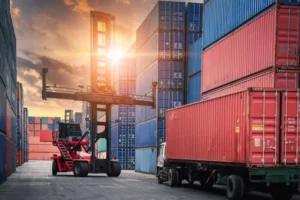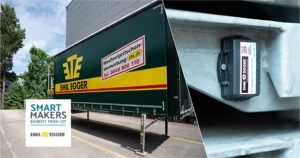Independence from freight forwarders and 3PL providers as a strategic advantage
In modern logistics, it is common practice to rely on freight forwarders and third-party providers (3PLs) to track supply chains and generate reports. However, as technology advances and supply chain management requirements become more complex, companies are increasingly recognizing the strategic added value that first-party data, i.e. self-collected logistics data, offers compared to telematics from 3PL providers.
Both options have their advantages and disadvantages and this article highlights the key considerations when choosing the right solution. We compare the dependence on external service providers with the independence offered by in-house data collection and show how companies can secure competitive advantages by choosing the right solution.

The risks of dependence on 3PL telematics
Data control and integration: Companies that rely on third-party telematics relinquish control over critical data that is essential for making informed business decisions. This applies to both the time availability as well as the accuracy and granularity of the data provided (e.g. tracking at pallet vs. truck level).
Adaptability and flexibility: Third-party systems often require companies to adapt their processes to the tools provided, which may not be the best fit for specific operational requirements or internal analytics systems.
Data security and confidentiality: The use of external telematics services increases the risk of data loss or misuse, as the information flows through and is stored in different systems. Having your own data sources makes it easier to control security.
Dependence on providers and compatibility issues: The use of 3PL systems often ties companies to specific platforms that are not always compatible with internal systems, which can make integration or a change of provider expensive and technically complex.
Fraud prevention and shipment integrity: Exclusive dependence on reports from external providers makes it difficult to gain full insight into the actual processing of deliveries and thus increases the risk of fraud or manipulation.
The advantages of your own tracking data
Complete control: In-house tracking processes allow companies to collect data promptly and accurately and tailor it to specific needs - a key advantage for dynamic decision-making.
Seamless integration: First-party data solutions can be designed to integrate seamlessly with existing ERP, CRM and supply chain management systems. This increases operational efficiency and maximizes the potential of the data without having to change the existing system.
Real-time monitoring and customization: Companies can customize their monitoring systems to capture real-time data to respond more quickly to logistical challenges or opportunities.
Independence from carriers: Using their own data collection systems enables companies to change providers at any time without interrupting the data flow or having to implement new systems.
Use of modern technologies: With access to first-party data, companies can use advanced technologies such as AI and blockchain to optimize the tracking of their goods, perform predictive analytics and ensure transparent, secure operations.
Simplified multimodal supply chain management: Using your own tracking systems avoids the complexity and integration issues associated with using multiple 3PL services for different modes of transportation. In-house tracking solutions accompany the shipment through all transportation phases and ensure a constant, reliable flow of data.
Increased supply chain resilience: By becoming independent of third-party providers and dispensing with external data sources, companies can fully control their supply chain data. This not only simplifies processes, but also increases the resilience of the supply chain to external disruptions and dependencies - a decisive advantage in an increasingly volatile market environment.

Practical implementations
IoT and modern tracking technologies: Advanced IoT solutions enable companies to monitor their supply chains in real time and collect detailed data on environmental conditions and the location of containers and goods. This information can be integrated directly into the company's own systems without the need for third-party providers as intermediaries.
Advanced fraud prevention: Technologies capable of detecting physical tampering - such as through light sensors or motion detection - allow companies to receive immediate alerts when the integrity of a shipment is compromised, minimizing the risk of fraud and damage.
Multimodal and international tracking: Modern tracking technologies enable goods to be tracked seamlessly across different modes of transportation, be it by ship, train, truck or warehouse. Companies receive end-to-end data in real time that maps the entire transportation process.
Detailed reporting: Advanced tracking devices can also record additional information such as vibrations or temperature fluctuations and transmit this in real time. This provides companies with detailed data on the condition of their goods throughout the entire transportation process - information that 3PL service providers are often unable to provide in this level of detail.rocess data on the condition and location of goods. This transparency enables companies to identify problems at an early stage and take immediate action.
Customer example: A laptop manufacturer
A laptop manufacturer that ships its goods from Asia currently relies on third-party data to track its shipments. This data often only includes information on the waypoints and transit status of the goods, which then appears with a time delay in the logistics partners' reports. For example, the manufacturer only finds out at the destination if a pallet of laptops has been damaged during transportation. With its own tracking solution, however, the manufacturer could monitor the entire transportation process in real time, record the data at the desired level of detail and thus react directly to disruptions or damage. This data would be seamlessly integrated into the internal systems and would be available to the manufacturer without delay, making the entire process considerably more efficient.
Conclusion
Although 3PL providers continue to play a key role in global logistics, the trend is clearly shifting towards the use of first-party data. Companies that rely on their own data collection not only secure a strategic competitive advantage, but also gain agility, efficiency and resilience. The use of modern tracking technologies enables companies to optimize their processes, minimize risks and lay the foundation for future growth and success.
By prioritizing first-party data, companies can not only better protect their assets, but also gain the necessary transparency to successfully master future opportunities and challenges in supply chain management.
Would you also like to create full transparency in your supply chain while retaining control over your data?




